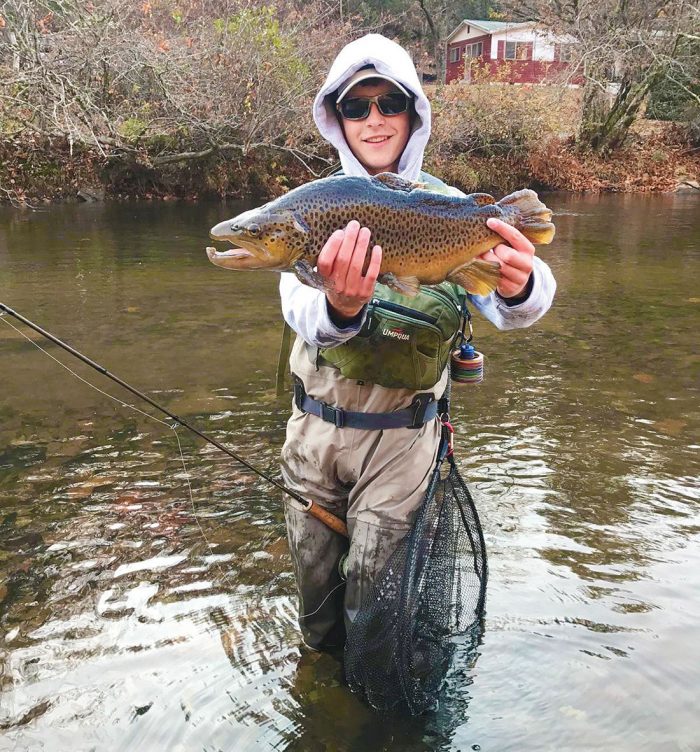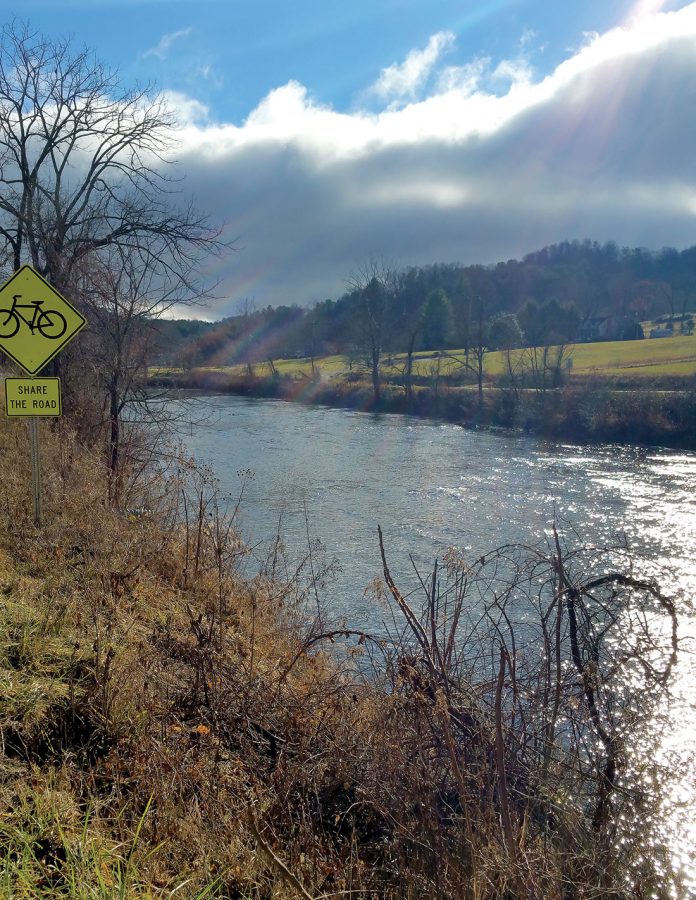By Shannon Messer
Nestled in the picturesque Blue Ridge Mountains of Western North Carolina, Jackson County is home to the Western North Carolina Fly Fishing Trail and its centerpiece, the Tuckasegee River, which dissects the county as it flows north to Fontana Lake. The “Tuck,” as it is known to the locals, is a beautiful tailwater trout fishery used for the 2011 USA Fly Fishing Championships, in which the Gold Medal was won by Team USA member Logan Egan.
The most popular time to fish the Tuck is during the delayed harvest (DH) fishing season from Oct. 1 to the first Friday in June each year. During this time frame, the Tuck is a catch-and-release fishery with artificial-lure, single-hook restrictions. This stretch of specially regulated water runs about 5.5 miles outside the small towns of Dillsboro, Sylva and Cullowhee. The boundaries of the DH are marked by signage on the banks.
These regulations appeal to fly fishers and spin fishers alike. You will not only see anglers stripping streamers, drifting nymphs, and casting dries, but you will see a fair number of spinner fishermen taking good numbers of brook, rainbow and brown trout.
Jackson County receives an annual stocking of 92,800 trout, the most in the state of North Carolina. In October and November 2016, the Tuck DH section was stocked with 19,600 trout. Rainbow and brook trout made up about 80 percent of this number, and the other 20 percent were brown trout. Normally, trout reach 12 inches in length before making it into the Tuck, but anglers should expect to see, and potentially land, some trophy-sized trout on any drift or presentation.
Many anglers wade the river, and drift boats are also popular. Stream flow is controlled by Duke Energy, which posts three days of release schedules on their website, www.duke-energy.com under the Nantahala link. Duke Energy has also provided boat ramps on Old Cullowhee Road and North River Road that many drifters use while floating the Tuck. South River Road is a popular area for anglers and guides due to the number of pull-offs that parallel the river and make accessing the river easy. Access to the Tuckasegee is great compared to some other rivers in the area, but there is some posted private property. Be sure to avoid it.
The Tuck is also part of the North Carolina Mountain Heritage Trout Waters program, which allows anglers to fish with a special three-day license that costs only $5. Many anglers opt to purchase a regular fishing license with a trout stamp since the fee is fair and it gives access to almost all the state’s trout waters. A non-resident can purchase a 10-day fishing license and trout stamp for $33 or an annual fishing license and trout stamp for $51.
The Tuck DH runs very close to downtown Sylva, yet its beauty catches most first-time anglers off guard. In fall, the red, yellow and orange leaves dancing on the trees highlight the contours of the surrounding mountains. A bald eagle might closely judge your fishing skills, watching for its opportunity to show you how it’s done.
Winter brings cleansing and the occasional snowfall, in which many local anglers find solitude chasing trout on tiny midges. Winter fishing pressure is minimal, which makes it a great time to land a large trout if you’re willing to test your mental toughness wading in cold water.
Spring comes to life with budding trees and insects hatching, signaling the coming summer. Anglers spend late evenings on the Tuck sight casting to rising trout honed in on larger dry flies and emerger patterns. Spring evenings can be very peaceful, since most anglers have broken down their rods by 6 p.m. and are headed to the local brewery or one of the many unique restaurants or food trailers in downtown Sylva or Dillsboro. There is a list of local restaurants and breweries at www.mountainlovers.com, or just ask local fly shop employees for their recommendation.
In 2016, the North Carolina General Assembly proclaimed Jackson County the Official Trout Capital of North Carolina. Jackson County is home to 4,600 miles of trout streams with a good mixture of hatchery supported streams and wild streams. Check out www.NCTroutcapital.com for more information.
Jackson County was also the first to have an officially designated Fly Fishing Trail, which highlights 15 different streams and rivers for any angler to test their skills. Many have taken the challenge of catching and releasing trout or smallmouth bass in each location. There is a map that gives detailed information about each stream, directions, and the type of fish anglers can expect to catch. More information is available at www.flyfishingtrail.com.
If you are looking for a fishery with plenty of trout and the opportunity to catch a 25-incher, the Tuck is for you. It is relatively close to Atlanta, Knoxville, Charleston and Charlotte. The Tuck is just an hour west of Asheville, N.C., and it is at the base of the Great Smoky Mountains National Park and Blue Ridge Parkway. This makes for a nice and easy weekend retreat, or it can be a popular destination for longer stays due to accessibility and other local attractions. Come and experience North Carolina trout fishing at its best!
Shannon Messer owns Appalachian Flies and manages and guides at Blackrock Outdoors Orvis Authorized Fly Shop at 570 West Main Street, Sylva NC 28779. Contact him at 828-631-4453 or appalachianflies@gmail.com.

